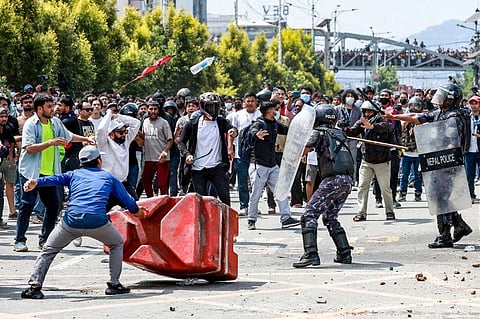
- Home
- Live Blog
- Breaking News
- Top Headlines
- Cities
- NE News
- Sentinel Media
- Sports
- Education
- Jobs

Jaideep Saikia
(Jaideep Saikia is India's foremost strategist and bestselling author.)
The second country to erupt in flames after Bangladesh in India's near-abroad is Nepal. The manner in which the phenomenon of "plebeian protest" has been destabilising elected governments and leaderships in India's neighbourhood is frighteningly similar to the "Arab Spring" or the "Orange Revolution".
While the visible triggers for the unrest that broke out in Bangladesh and the one that is being witnessed presently in Nepal are "unjust" government actions, such as the reservation for the families of the 1971 War of Liberation, which created Bangladesh after it severed itself away from a predatory Pakistan, and the banning of social media in Nepal, the hidden reason is extraneous. The ongoing unrest in Nepal is clearly a result of the United States' "Deep State" interference.
One has to only draw attention to the fact the protests were largely mobilised on Facebook, a platform with active ties to US intelligence. Langley and its affiliates are working overtime in Nepal to erect both an anti-India and an anti-China staging post in the country. The US has clearly been led by the strategic consideration that the location of Nepal is just right for launching its present subterfuge. While countering Chinese influence in Nepal would have been uppermost in the US' latest 'regime change' exercise, the unrest could also be to manipulate Nepal's border dispute with India to further US interests, as well as to provoke anti-government protests in India. The fact that the unrest broke out almost simultaneously all over Nepal, too, points at premeditated orchestration. A group called 'Hami Nepal' is reported to be puppeteering the violence from the shadows.
The US has a significant presence in Nepal through a plethora of organisations, including the Asia Foundation, the USAID and the Open Society Foundation. These organisations have been attempting to shape Nepal's policies, laws, and security frameworks.
Nepal's geostrategic location between India and China makes it a crucial point for disrupting regional politics and utilising the region as an outpost for its nefarious designs.
Deep US hands are trying to expand its influence in Nepal to counterbalance China's growing presence and, at the same time, drive a wedge between India and China, two countries that have recently sought to forego differences and work together in order to resolve issues such as the vexed boundary issue. The move towards 'Amity' between the two Asian giants has greatly unsettled Washington DC.
It is hoped that New Delhi is taking the correct rearguard actions in order to ascertain that a spillover effect does not occur in India. The possibility of similar unrest happening in India is a long shot but is a matter of concern, given the two countries' proximity and the ongoing tension in Nepal. Agent saboteurs are aplenty in the region that has been chosen by the most aggressively neocolonial of states in the world by way of the US.
It has been learnt that India has taken proactive measures to prevent any potential spillover of violence that is tearing apart Nepal. But New Delhi must guard against rumours and statements by irresponsible political voices who are publicly drawing parallels between the situation in Nepal and India, citing corruption and authoritarianism as potential triggers for unrest in India. Indeed, such people could well be American agents who are on unholy payrolls to destabilise India.
But even as New Delhi sets into motion a set of armours against a 'regional rage', it must introspect as to how India's internal intelligence has once again been caught on the wrong foot. Indeed, the story of continual failures of India's internal intelligence agency has been one of utter non-performance. Beginning with Manipur, Bangladesh, Baisaran and now Nepal, the plethora of debacles can no longer be excused. The political leadership must act quickly and undertake some serious housekeeping and spring clearing in the highest echelons of internal intelligence of India.
One or even a second mistake may be overlooked, but if the Head of the Government or the National Security Adviser continues to allow the people who are failing to continually anticipate offshore conspiracies, then the Indian electorate would be forced to suspect reasons other than a mere unavoidable lapse that has been permitted to endanger India's national security again and again. It is time to act visibly and decisively.